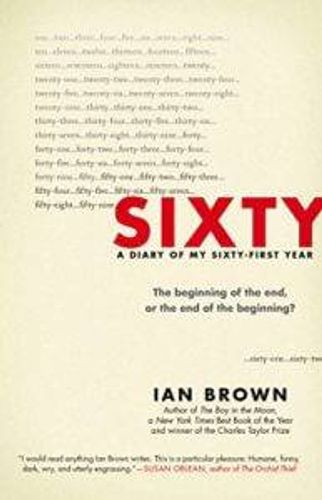Bestselling Author Publishes Witty Diary About Turning 60
Aging shouldn't be something we look away from, Ian Brown says
Ian Brown, a Toronto writer whose newspaper articles in The Globe and Mail and previous books have been widely praised, nonetheless worries about his legacy in a rich new book about turning 60: Sixty: A Diary of My Sixty-First Year.

He also worries about what’s happening to his body, what’s happening to his health, his masculine appeal, his finances and whether he is making the most of the years he has left.
As do many of us boomers.
Brown said he was inspired to write a day-to-day compilation of thoughts on life at this age because he didn’t see that anyone else had. Plenty of other volumes, including self-help books, talk glibly about reinventing aging as a “younger future,” Brown says. But he wanted to write “original, truthful, sad but amused, authentic writing on the subject of getting older…”
Looking Aging in the Face While Turning 60

Brown notes that older adults have been treated in Western society as if they are invisible; we deny that people get older, even as each of us does. “I thought it might be an interesting experiment to stare in the face of that denial, and keep track, at even the most mundane daily level, of the train coming straight at us,” he writes.
That metaphor may tip you off: Brown is not exactly greeting the changes of older age with a joyful heart.
While acknowledging the many advantages he has — a healthy relationship with his wife Johanna, work, good friends, relative good health — he also obsesses about what seems to be going wrong, or what will go wrong down the road.
There’s hemorrhoids, plantar fasciitis and the specter of brain decline. There is, on one occasion, a horrible fear that the grey Cole Haan suede shoes with the bright yellow soles that Brown thought were ever so hip now made him look “circus-like.”
A Sharp, Dark Wit
Though the book’s pages are filled with much emotional gnashing of teeth, Brown can’t help but turn some of the absurdities he faces into humor.
One of my favorite stories involves his discussion with his insurance agent about his finances. When Jodi-with-an-i asks whether Brown is familiar with the young YouTube entrepreneurs who make loads of money through their popular videos, he wants to “decapitate her on the spot.”
Brown writes:“The implication is clear: if I wasn’t such a stiff old f---up, I could be making half a mill on YouTube." Jodi offers as an example “those two guys in Montreal, the bacon guys? They cook bacon all the time on YouTube?... They make over a million a year.” (The two twentysomethings produce a series called Epic Meal Time.)
Brown admires the men for what they’ve accomplished, he says. But why, he wonders, is his agent suggesting he emulate them? “I can’t really see a YouTube channel called An Old Guy Who Loves Bacon,” he writes. “Perhaps I could do An Old Guy Who Doesn’t Like Anything and Is Old Before His Time.”
What Could Have Been
The laugh-out-loud passages are tempered by a poignant theme Brown comes back to time and time again: regret.
One passage reads, “I hate having regrets, but at 60 they show up, sharp and aggressive, like nasty dogs. Regrets, and a fog of guilt, for not having put myself on the line more — for not having made more of an effort with my mother, despite her incessant guilt-mongering and threats and physical abusiveness, for not having seen how terrified she must have been. For not having loved Johanna more unreservedly. For not having committed more wholeheartedly to the project of making something of this short slip of time that is my life.”
By the end of the year of diary entries, Brown concludes that the best way to approach aging is to avoid panic. We are better off paying attention to what is coming, he says, rather than trying to pretend it isn’t happening. Otherwise, we might miss everything else going by.


